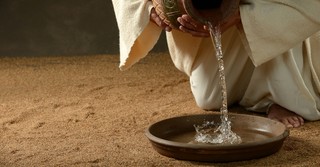
- Recent Translations
- All Translations
Videos for Luke 7:14

Luke 7:14 Meaning and Commentary
And he came and touched the bier
Or "bed", as the Syriac version renders it; and such was (hjm) , "the bier", or bed, on which one of three years old, and upward, was carried as above mentioned: so that on which Herod was carried to his grave is called (klinh) "a bed", by Josephus F25. As for the bed, or bier, of what sort it was that they carried out their dead upon, take the following account: F26
``formerly the rich carried out (their dead) upon a bed called Dargash, (which is said F1 to be a bed that was not platted with ropes, and is called a bed of fortune F2,) and the poor carried out (their dead) upon one that was called Celicah, (or Celibah, as sometimes read; and this was made in the form of an iron horn, on which they bound the corpse, that it might not fall; and it was called so, because it was made like a coup of birds F3 as the word is used in ( Jeremiah 5:27 ) ) and the poor, were made ashamed; and therefore they ordered that all should carry out (their dead) on a Celicah, for the honour of the poor.''To this Christ came near and touched: not that by his touching of that, the dead should be raised; but this he did as a signal, that the bearers should stop. The Jews F4 say, one of the charges that Jacob gave to his sons before his death, was, to:
``take care (says he) that no uncircumcised person, (ytjmb) (egy) , touch my bed, or "bier", lest the Shekinah remove from me; but, according to this order, do unto me, carry me, three on the north, three on the south, three on the east, and three on the west''From whence it should seem, that a circumcised person, as Christ was, might touch a bier without offence, or hurt, and without contracting any ceremonial pollution: to touch a dead body, or the bone of man, or a grave, was forbidden by the law, ( Numbers 19:16 ) and so, according to the traditions of the elders F5, the stone that was rolled at the mouth of the sepulchre, and the, side of the sepulchre, defiled by touching; but I do not find that touching a bier was ever forbidden.
And they that bare him stood still:
these are they that are called (hjmh yavwg) "the bearers of the bed", or "bier": and Maimonides F6 says,
``they carry the dead upon their shoulders to the grave; and the bearers of the bier are forbidden to put on their sandals, lest the latchet of any one of them should fail, and should be found to hinder him doing his duty.''And elsewhere it is said F7,
``the bearers of the bed, or bier, and their deputies, and their deputies' deputies, both before the bier and after it, find whoever the bier stood in need of, were free;''i.e. from reading the Shema, or, "hear, O Israel" and from prayer: the reason of their having so many bearers was, because they carried the dead a great way to be buried. King Herod was carried after this manner two hundred furlongs from Jerusalem, to the castle of Herodion F8:
and he said, young man, I say unto thee, arise.
The Ethiopic version adds, "and he arose": Christ spoke as one that had the keys of death and the grave; and divine power went along with his words, which raised the dead man to life; and full proof this is of the true and proper deity of Christ.
F25 De Bello Jud. l. 1. c. 33. sect. 11.
F26 T. Bab. Moed Katon, fol. 27. 1, 2.
F1 T. Hieros. Beracot, fol. 5. 4.
F2 T. Bab. Nedarim, fol. 56. 2.
F3 R. Sampson & Bartenora in Misn. Para, c. 12. sect. 9.
F4 Bereshit Rabba, sect. 100. fol. 87. 4.
F5 Misn. Oholot, c. 2. sect. 4.
F6 Hilchot. Ebel, c. 4. sect. 2. 3.
F7 Misn. Beracot, c. 3. sect. 1.
F8 Josephus, ut supra. (De Bello Jud. l. 1. c. 33. sect. 11.)